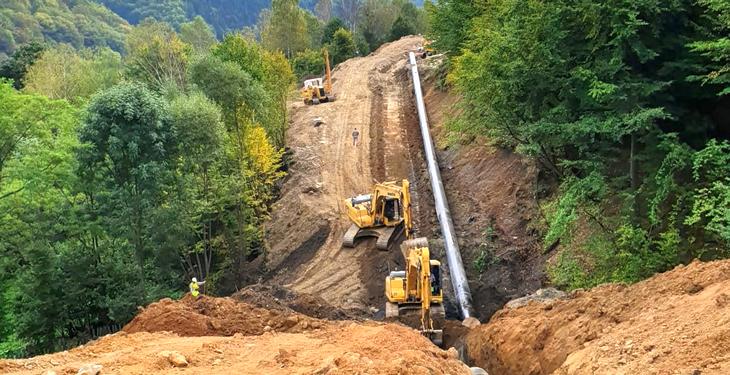Transgaz announced the completion, on Sunday at 16:15, of the works on the company’s most important investment project, worth almost half a billion euros, the BRUA 1 gas pipeline. It links the Romanian transport system with those in Bulgaria and Hungary.
After the completion of BRUA 1, Romania’s gas export capacity will increase to 1,75 billion cubic meters per year to Hungary and 1,5 billion cubic meters per year to Bulgaria.
The project was worth more than €478 million, of which nearly €98 million came from Transgaz own resources and €381 million was attracted financing. Of these, EUR 170 million is European funding. This is a 479-kilometer pipeline and three compression stations (SC Jupa, SC Podișor and SC Bibești), which was inaugurated and operated in September and October 2019 and August 2020 respectively.
Talking about the interconnection agreements, Ion Sterian, general manager of Transgaz, explained during the conference “Regional approach Chisinau”, organized by Energynomics, that there are delays due to some technical and regulatory elements. “In Ukraine, a non-EU state, the secondary legislation issued by the regulator allows gas to be exported at a minimum of 90% methane; in Bulgaria, the regulator imposes a limit of 75% methane content on its own production (about 10% of national consumption); in Romania, the regulator issued secondary legislation with a methane content of 85%. A discussion is to be held between the regulatory authorities of these countries, plus Greece and Macedonia, to establish the same methane content in all national regulations.” It is only on the Romanian – Hungarian relationship that the issue has already been solved, said the head of Transgaz.
Beyond this issue, Ion Sterian said that although the interconnection agreements for Transit II and Transit III were ready, the documents could not be signed as the contract still in force with Gazprom violates certain provisions of the European Commission’s 3r Energy package. “It has been negotiated with Gazprom, and now a new contract is in corporate approval procedures at both Gazprom and Transgaz. As soon as this new contract is signed and the issue of methane content is regulated, the Transit II and Transit III interconnection agreements will be signed with both the Ukrainian gas transmission system operator, GTSO, and Bulgartransgaz”, said Ion Sterian.
At the end of July, Transgaz announced the completion of the construction of the Ungheni-Chisinau gas pipeline in a length of 120 kilometers. The pipeline allows gas to be transported in volume of 1,5 billion mc/year, and after completing in 2021 investments on Romanian territory for the construction of about 165 km of the pipeline on the Onești-Gherăești-Lețcani section, the transport capacity will increase to 2,2 billion mc/year. Thus, the pipeline will be able to provide about 75% of the average consumption of the Republic of Moldova (including the Transnistrian region) or about 60% of the average consumption of the country during the cold period of the year (including the Transnistrian region). “The gas pipeline is functional, at any time gas can reach the Chisinau CET and the Chisinau natural gas distribution network”, said Ion Sterian.
